43 why are serving sizes standardized on food labels
F.D.A. Weighs Update to Standard Serving Sizes - The New York Times On today's food packages, many of the serving sizes puzzle even the experts. ... But the calorie count refers to a one-ounce serving, and the label says the bag holds one-and-one-third servings ... Health 9th grade Access KJ Module 2.4 and 2.5 ... - Quizlet The standardized serving sizes inform consumers of the number of servings in a package, and make it easier to compare to similar foods. impact of standardized ...
Serving Size vs Portion Size Is There a Difference Serving size is a standardized amount of food. It may be used to quantify recommended amounts, as is the case with the MyPlate food groups, or represent quantities that people typically consume on a Nutrition Facts label. Portion size is the amount of a food you choose to eat — which may be more or less than a serving.
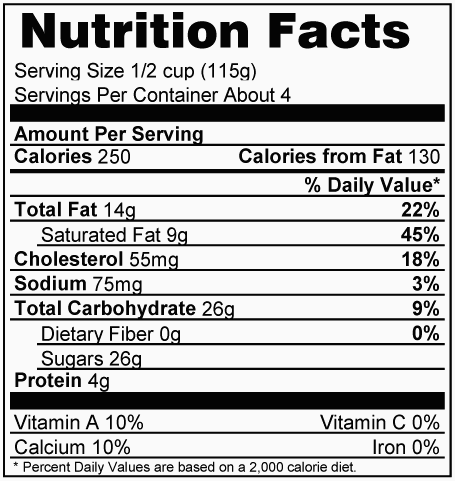
Why are serving sizes standardized on food labels
Food Labels Guide & Examples | How to Read Nutrition Labels - Video ... Food labels are read most easily from top to bottom and left to right. From top to bottom, food labels identify the following information: Servings per container and serving sizes. Calories per ... No, serving sizes on food labels don't tell us how much we ... 8 Oct 2019 — Even though labelled serving sizes are not related to standard serves or the recommended amounts that should be eaten, research shows consumers ... Why do food labels have standardized "serving sizes" and "servings per ... Why do food labels have standardized "serving sizes" and "servings per container" listed on label? ANSWER 0 colbib ANSWERS: 1-Icy-so you know how much to eat and also tells you how many ppl can eat that amount before it is gone. you have a cup of noodles serving size is 1/3 cup than you can get 3 servings from container. helps with meal ...
Why are serving sizes standardized on food labels. FDA Food Product Labeling & Packaging Requirements - ESHA Food Product Labeling and Packaging 101. The FDA regulates most packaged foods sold in the United States and has specific requirements for what elements a package must contain (e.g. a Nutrition Facts panel, ingredient statement, etc.). In order to sell your food products, you must comply with the FDA's packaging laws unless your operation is ... Differences between EU and US nutrition labels go far beyond ounces and ... "After the FDA finalizes the rules to update the nutrition facts label and serving sizes, the agency will be in a better position to make decisions regarding front-of-package labeling," says ... Food Label Flashcards | Quizlet Serving Size and serving per container Serving sizes are supposed to be standardized to reflect the amt of food people actually eat, but sometimes they are quite unrealistic. How to find out calories # of calories x servings per container 90 x 4 = 360 calories How to find percent of calories from fat calories from fat / calories 30 / 90 = .33 = 33% Understanding FDA Food Labeling: A Guide for Food Manufacturers - LabelCalc Calories per portion can be determined with online nutritional analysis software by simply entering your product recipe and serving size. Total calories and calories from fat are both required. Calories per serving should be rounded in the following ways: Under 50 calories: Round up or down to the nearest 5 increment (i.e., 36 calories becomes 35)
Serving Sizes In The Food Guide Pyramid And On Food Labels In comparison, the serving sizes on the food label are standardized to help you compare similar products. The Food and Drug Administration (FDA) based these reference serving sizes on the amount of the food item typically eaten in one sitting, derived from nationwide food consumption surveys of Americans. The Difference Between 'Portion Size' and 'Serving Size' (and Why It ... It's true that understanding serving sizes helps you make sense of food labels, so that you can get a more accurate sense of the nutritional makeup of your food depending on how many servings you... Definition and Importance of the Serving Size | Healthfully The serving size creates a standard reference used on food labels. Importance The standardized serving size is one tool you can use to be sure you're following a healthy, balanced diet. The United States Department of Agriculture determined that nutritional values be contained in the defined serving size. More Realistic -- Serving Sizes for Food Labels - HuffPost FDA Proposes Larger -- More Realistic -- Serving Sizes for Food Labels The FDA is proposing to change the standard serving sizes to reflect what people actually eat. The FDA defines the current serving sizes as amounts of foods commonly consumed based on dietary intake surveys conducted in the 1970s and 1980s. By Dr. Lisa Young, Contributor
Why Are Serving Sizes on Nutrition Labels So Small? The tables are intended to describe the amounts typically consumed in a serving, but the FDA determined these figures before Americans began eating more fatty, sugary, and salty foods. Notice... Consumer Survey: Understanding Portion and Serving Sizes Regardless of food or beverage category, about half say they try to eat close to the serving size listed on packaging. The top-ranked reasons for paying attention to portion sizes are to help control weight (36% ranked in top 2) and to help avoid eating too much of certain foods (30%). Serving Size vs. Portion Size, What's the Difference? - Prevention A serving size is defined as a standardized, measured amount of food. This is most commonly used by the United States Department of Agriculture (USDA) in reference to food groups or printed on... IFIC Study Serves Up Reality Check on Serving, Portion Sizes January 26, 2022 IFIC Study Serves Up Reality Check on Serving, Portion Sizes (Washington, D.C.)— We've all seen "serving size" listed at the top of the Nutrition Facts label. But what exactly does that mean? What about the term "portion size"? The International Food Information Council (IFIC) has conducted a new survey to gauge how much consumers know — and, importantly, whether ...
How to Understand and Use the Nutrition Facts Label | FDA - U.S. Food ... Serving sizes are standardized to make it easier to compare similar foods; they are provided in familiar units, such as cups or pieces, followed by the metric amount, e.g., the number of grams (g)....
The Nutrition Facts Label: Its History, Purpose and Updates 9 Mar 2020 — The NLEA required food packages to contain a detailed, standardized Nutrition Facts label with information such as: serving size; the number ...
Who Decides Serving Sizes? | HuffPost Life A serving size is a measurement that allows food manufacturers to create accurate and uniform nutrition labels across brands. It is not a prescriptive size that relates to health.
How to Read Food Labels - Buckeye Food Alliance 20 Jan 2019 — Serving sizes put all the other information on the food label into context. Serving sizes are standardized which makes it easy to compare ...
Nutrition Facts Matter: What Food Labels Mean (and Why They Changed) Pay extra attention to the serving size. This is often one of the most overlooked items on the nutrition facts label. An official serving may be smaller that you think. A "serving" is different from a "portion." A serving is a measured amount of food. A portion is the amount you decide to actually eat for a meal or snack.[2]
'Portion Size' and 'Serving Size' Are Not the Same: Why It Matters "Serving size" is based on a standardized amount of food or drink which is established by research done on the eating habits of adults and children. Understanding the difference between portion...
The Importance of Reading the Food Label and Nutritional Facts Going forward, the serving sizes must be based on what people are actually eating, not what they should be eating. And for packages that are between one and two servings, the rest of the caloric and nutritional information must be labeled as a single serving since people tend to consume these size packages in one sitting.
Serving Size on the New Nutrition Facts Label | FDA - U.S. Food and ... Some serving sizes have changed on the new Nutrition Facts label. By law, serving sizes must be based on the amount of food people typically consume, rather than how much they should consume....
Serving and Portion Sizes Explained - Lark Serving sizes are standard amounts of food. The Academy of Nutrition and Dietetics explains that they are the amounts of food that you may see on a nutrition facts panel. And they can be the amounts you see when you are looking at recommendations for daily intake. Portion sizes are the amounts of food that are served or eaten.
Serving Size vs. Portion Size, Explained by a Dietitian - Real Simple What Is a Serving Size? Simply put, a serving size is a specific and standardized amount of food like 1 cup, two slices, or 30 grams. "Think about a box of graham crackers," Green explains. "The nutrition facts label on the box may say that the serving size is eight crackers.
Serving Size and Nutrition Labelling: Implications for ... - NCBI by N Kliemann · 2018 · Cited by 33 — Most countries with mandatory food labelling require that serving size be presented on food labels, but variation in this information is ...
Solved REVIEW QUESTIONS 1. Which types of DRI standards can | Chegg.com Why are serving sizes standardized on food labels? quacy of nutrient intake in a population? 11. How do the This problem has been solved! See the answer Show transcribed image text Expert Answer Ans 1. RDA or Recommended dietary allowances provide the need of the diet in a healthy individuals of each gender. Ans2. EAR or Esti … View the full answer
The FDA's New Nutrition Labels Make So Much More Sense - Shape 5 Things You Need to Know About the New Nutrition Facts Label Food and Drug Administration Even if serving sizes might sometimes seem arbitrary, they're standardized based on what the FDA calls the reference amounts customarily consumed (RACC). Those numbers are based in part on national survey results, so they're subject to change.
IFIC Study Serves Up Reality Check on Serving, Portion Sizes The ways people control their portion sizes vary: Similar numbers said they try to eat more slowly (34%), stop eating once they feel full, even if there's still food on their plate (34%), use ...
How to Read Foodstuff Labels: Serving Size Vs Portion Size 6 Mar 2020 — Serving sizes are standardized to make it easier to compare similar foods; they are provided in familiar units, such as cups or pieces, followed ...
Portion Size Versus Serving Size | American Heart Association Serving Size is the amount of food listed on a product's Nutrition Facts label. So all of the nutritional values you see on the label are for the serving size the manufacturer suggests on the package. Once we understand the difference, it's easier to determine how much to serve and easier to teach kids the difference between the two. ...
Why do food labels have standardized "serving sizes" and "servings per ... Why do food labels have standardized "serving sizes" and "servings per container" listed on label? ANSWER 0 colbib ANSWERS: 1-Icy-so you know how much to eat and also tells you how many ppl can eat that amount before it is gone. you have a cup of noodles serving size is 1/3 cup than you can get 3 servings from container. helps with meal ...
No, serving sizes on food labels don't tell us how much we ... 8 Oct 2019 — Even though labelled serving sizes are not related to standard serves or the recommended amounts that should be eaten, research shows consumers ...
Food Labels Guide & Examples | How to Read Nutrition Labels - Video ... Food labels are read most easily from top to bottom and left to right. From top to bottom, food labels identify the following information: Servings per container and serving sizes. Calories per ...
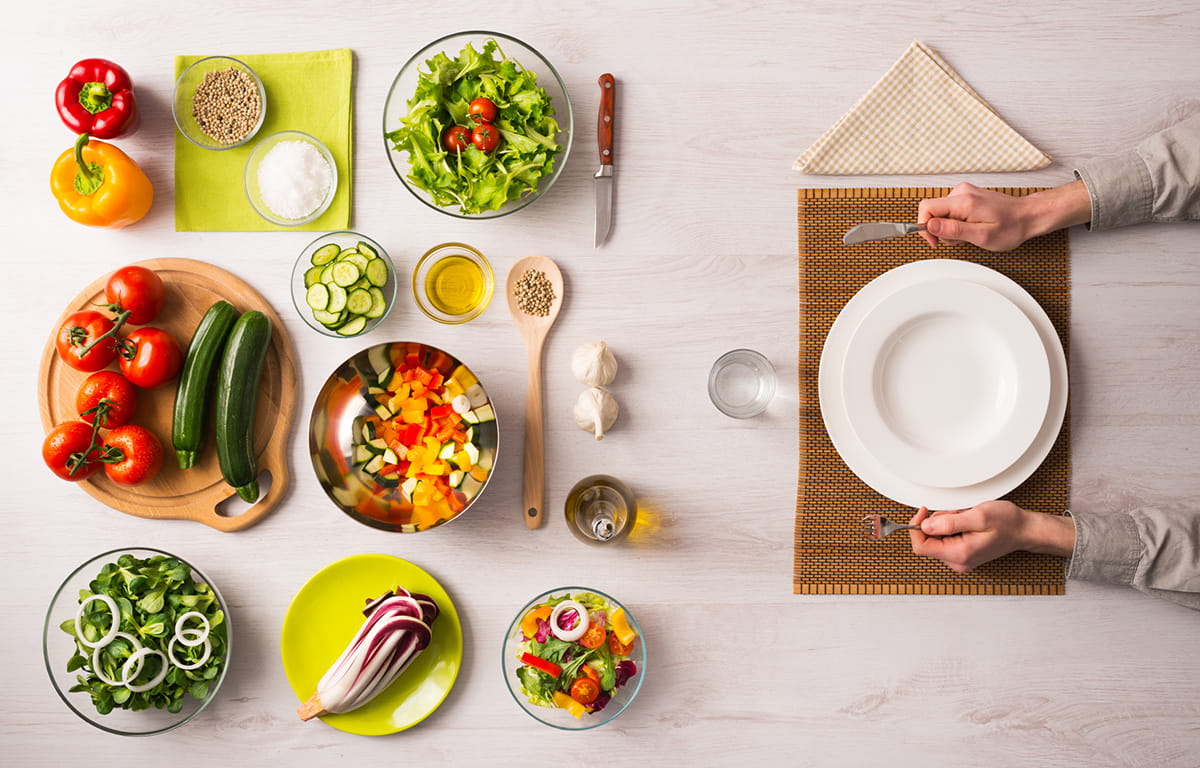


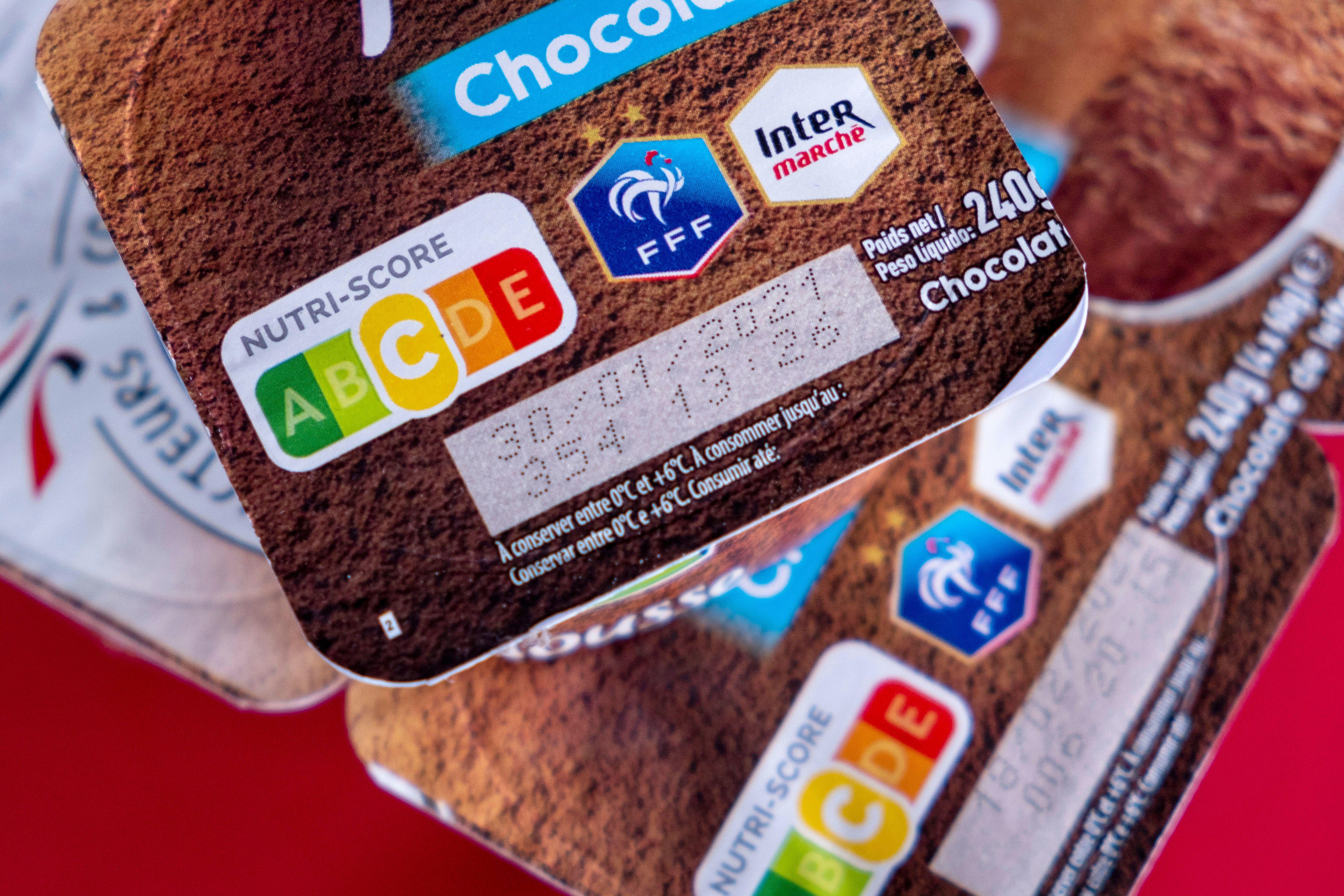
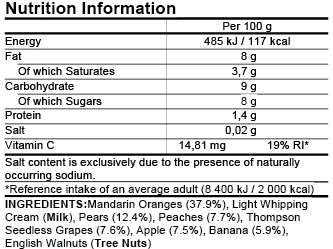





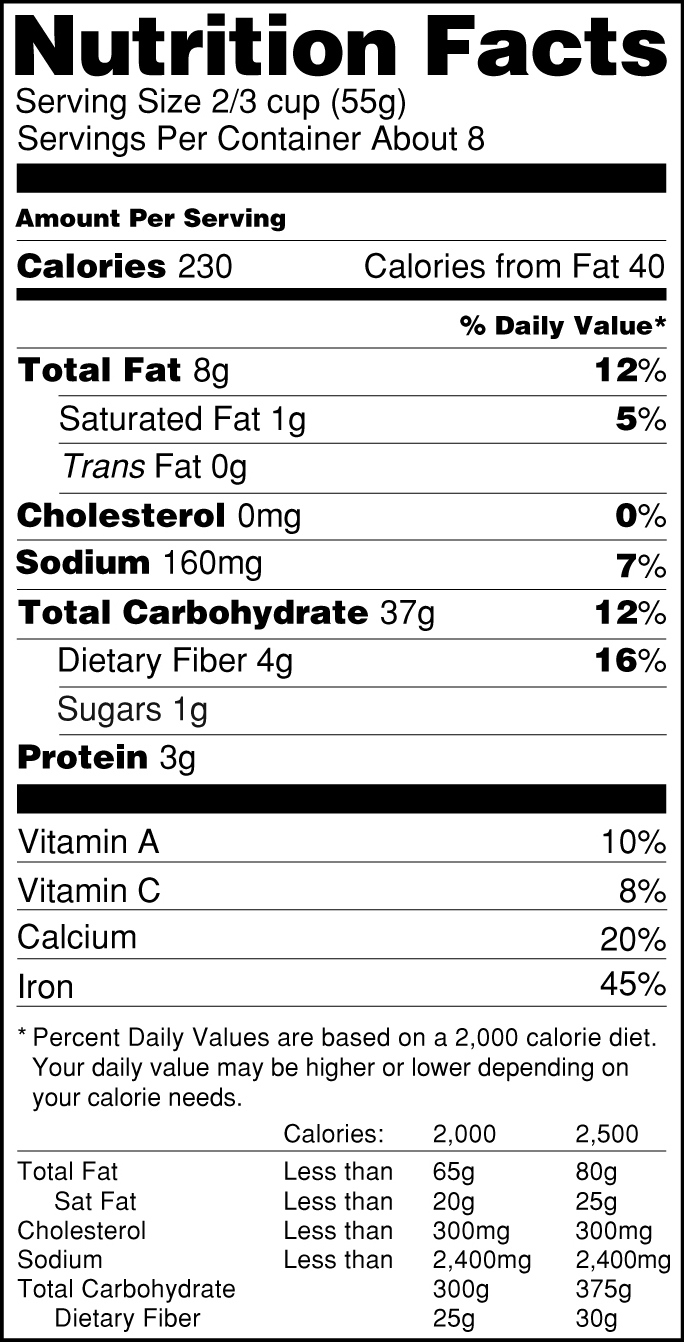













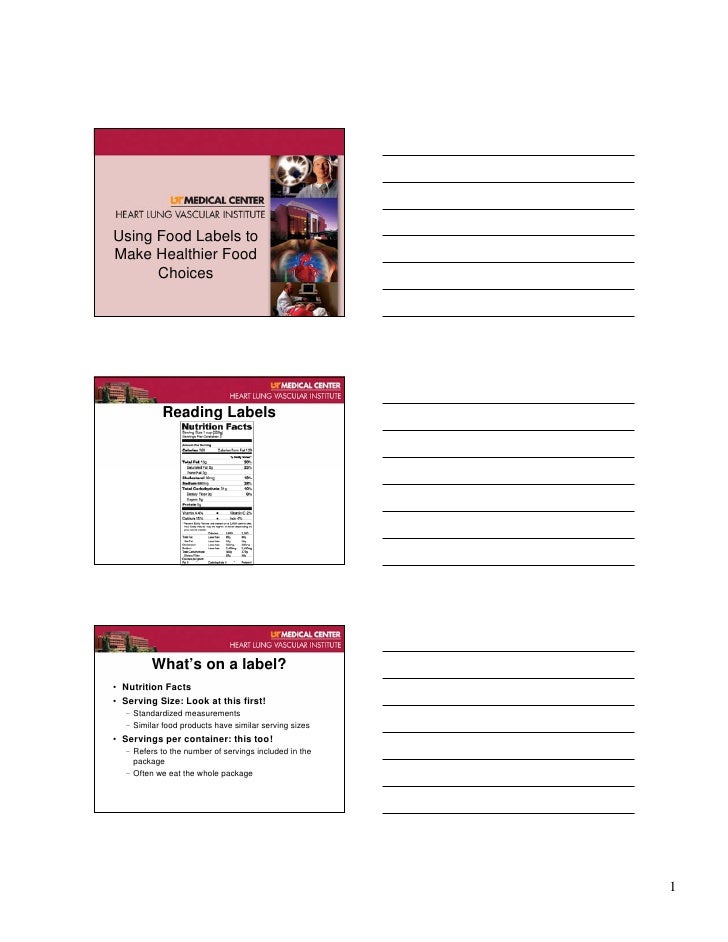
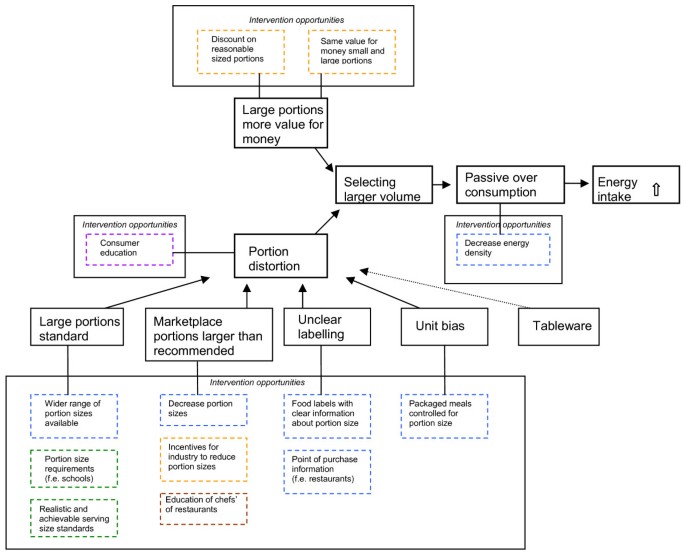




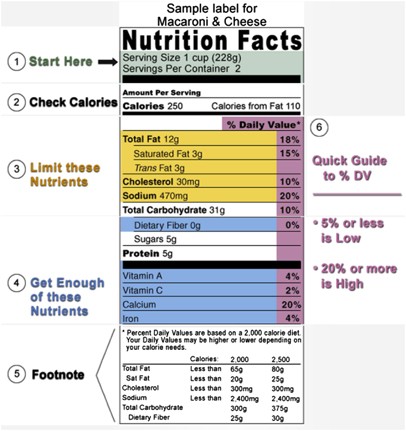

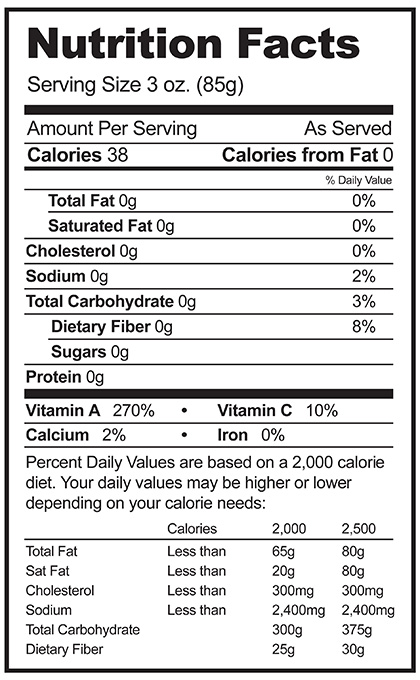




Post a Comment for "43 why are serving sizes standardized on food labels"